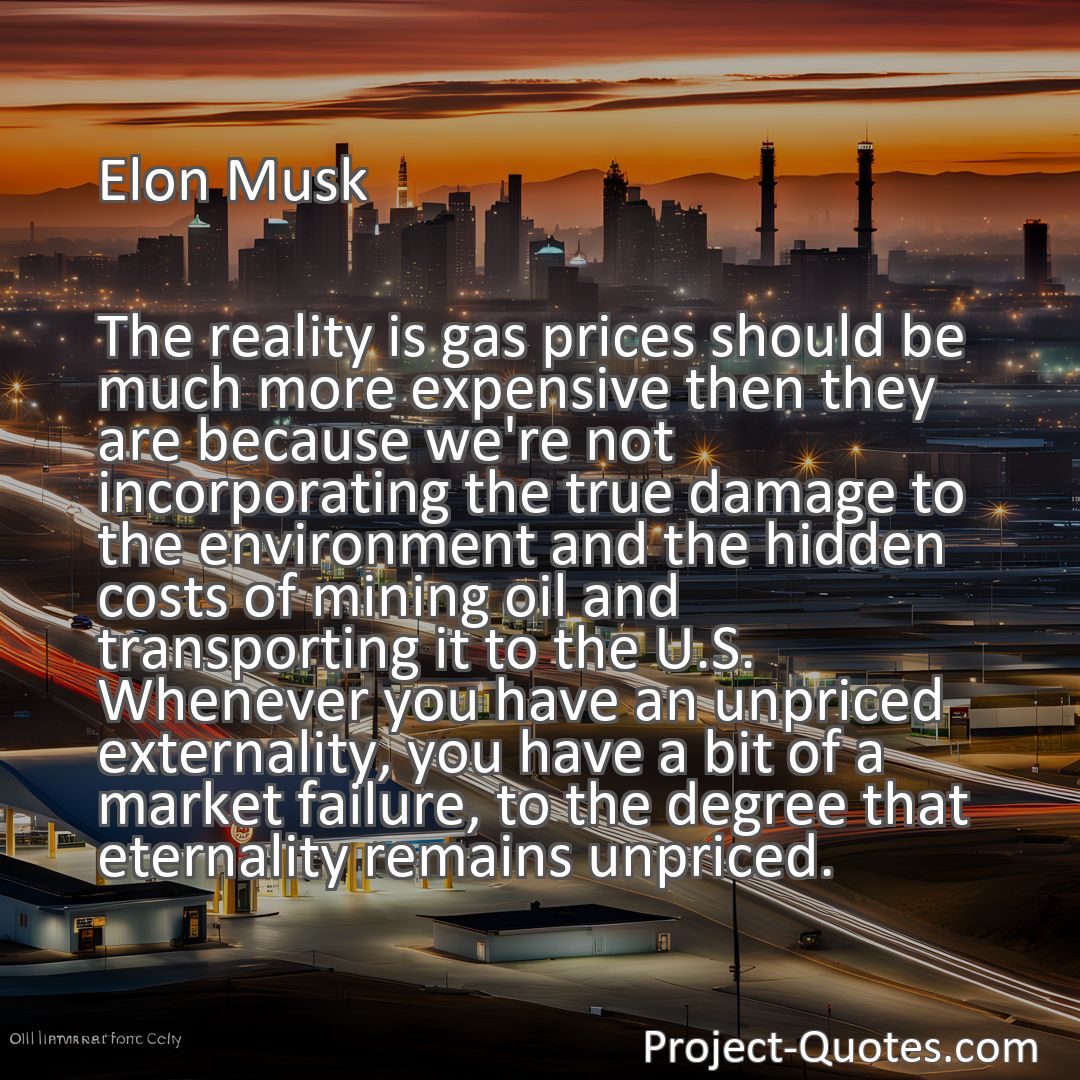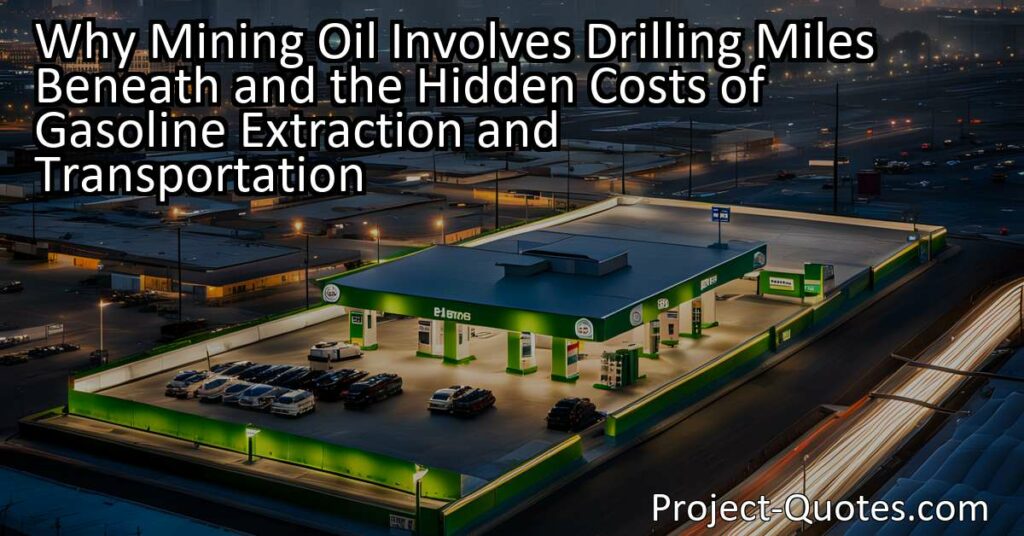Elon Musk
Mining oil involves drilling miles beneath the Earth’s surface, often in sensitive ecosystems such as oceans and forests. This extraction process can have devastating environmental consequences, including spills, leaks, and harm to wildlife and water sources. Understanding the hidden costs of oil extraction is crucial for creating a more sustainable future.
Table of Contents
- 1 The reality is gas prices should be much more expensive then they are because we’re not incorporating the true damage to the environment and the hidden costs of mining oil and transporting it to the U.S. Whenever you have an unpriced externality, you have a bit of a market failure, to the degree that eternality remains unpriced.
- 2 Elon Musk
- 3 Meaning of Quote – The reality is gas prices should be much more expensive then they are because we’re not incorporating the true damage to the environment and the hidden costs of mining oil and transporting it to the U.S. Whenever you have an unpriced externality, you have a bit of a market failure, to the degree that eternality remains unpriced.
- 4 Freely Shareable Quote Image
- 5 Related
Gas prices are a constant subject of discussion and debate among drivers and economists alike. Many people, including the renowned entrepreneur Elon Musk, believe that gas prices should be higher than they currently are. Musk argues that the true cost of gasoline is not adequately reflected in its current price, mainly due to the damage it inflicts on the environment and the hidden expenses associated with its extraction and transportation.
When we think of the cost of gasoline, we tend to focus solely on the amount we pay at the pump. However, Musk reminds us that this price is merely the tip of the iceberg. Gasoline production and consumption have significant environmental consequences, including pollution, climate change, and ecosystem degradation.
One of the major issues with fossil fuels like gasoline is their contribution to greenhouse gas emissions. Burning gasoline releases carbon dioxide (CO2) and other greenhouse gases into the atmosphere, trapping heat and leading to global warming. The combustion of fossil fuels is one of the primary drivers behind climate change, with devastating impacts on our planet, such as rising sea levels, extreme weather events, and ecosystem disruptions.
In addition to pollution, the extraction and transportation of oil also come with hidden costs. The process of mining oil involves drilling miles beneath the Earth’s surface, often in sensitive ecosystems such as oceans and forests. This extraction process can result in spills, leaks, and other accidents that harm wildlife and contaminate water sources. The environmental damage caused by oil extraction can be long-lasting and difficult to remediate fully.
Once oil is extracted, it must be transported to refineries and then distributed to various locations, including the United States. The transportation of oil involves tankers, pipelines, and trucks, and each method poses potential risks. Spills from tankers and pipeline leaks have been responsible for catastrophic accidents, causing significant harm to ecosystems and human health. These accidents also require extensive clean-up efforts, which can be costly and time-consuming.
When we take into account these environmental impacts and hidden costs, the current price of gasoline appears significantly undervalued. By failing to incorporate the true damage to the environment and these hidden expenses into the price, we are essentially creating a market failure. This failure occurs because gasoline consumers do not bear the full cost of their actions and, as a result, do not have an adequate incentive to reduce their consumption or seek alternative solutions.
To address this market failure, Elon Musk suggests that we should incorporate the externalities associated with gasoline consumption into the price. By internalizing these costs, the price of gasoline would rise to reflect its true environmental impact. This increase in price would serve as a financial deterrent, encouraging individuals to seek alternative modes of transportation and incentivizing the development and adoption of cleaner technologies.
Musk’s argument highlights the importance of considering the broader implications of our actions and the hidden costs associated with our choices. It serves as a reminder that seemingly inexpensive products or services might have far-reaching consequences that are not adequately reflected in their price tags. By ignoring these externalities, we risk depleting natural resources, damaging ecosystems, and exacerbating climate change.
Fortunately, there are alternative solutions to fossil fuels that are already available or under development. Electric vehicles (EVs) offer a promising avenue for reducing our dependence on gasoline. EVs produce zero tailpipe emissions and are more energy-efficient, making them a cleaner and more sustainable transportation option. However, the wider adoption of EVs requires significant investment in charging infrastructure and advancements in battery technology to address concerns such as range anxiety and charging times.
Investments in renewable energy sources and the development of sustainable transportation options are crucial steps towards a future with cleaner and more affordable transportation. Governments, businesses, and individuals need to recognize the true cost of gasoline and take responsibility for their environmental impact. By fostering innovation and supporting sustainable alternatives, we can pave the way for a more environmentally conscious and economically viable future.
In conclusion, Elon Musk’s assertion that gas prices should be higher is rooted in the idea that the current price fails to account for the true damage to the environment and the hidden costs of oil extraction and transportation. Gasoline consumption contributes to pollution, climate change, and ecosystem degradation, with long-lasting consequences for our planet. By internalizing these externalities and incorporating them into the price of gasoline, we can create a more accurate reflection of its actual cost and encourage a shift towards cleaner and more sustainable transportation options. It is vital that we acknowledge and address the hidden costs of gasoline to ensure a healthier, more sustainable future for generations to come.
I hope this quote inspired image brings you hope and peace. Share it with someone who needs it today!


